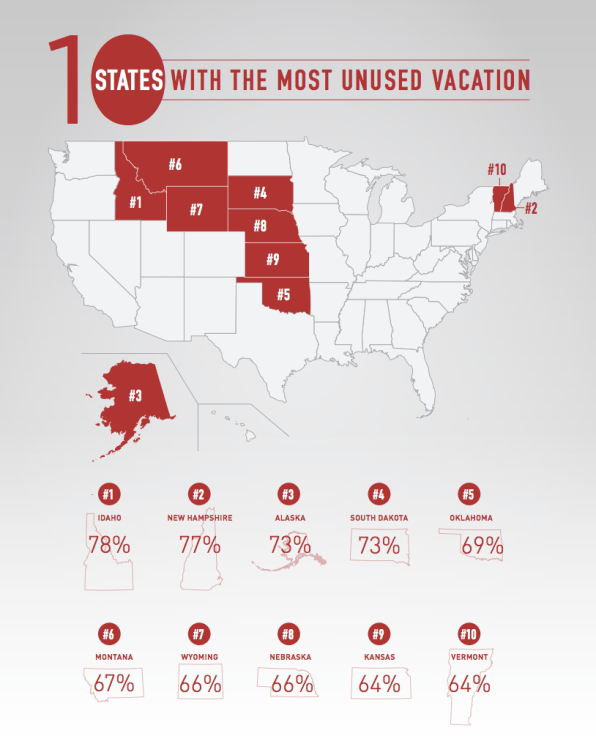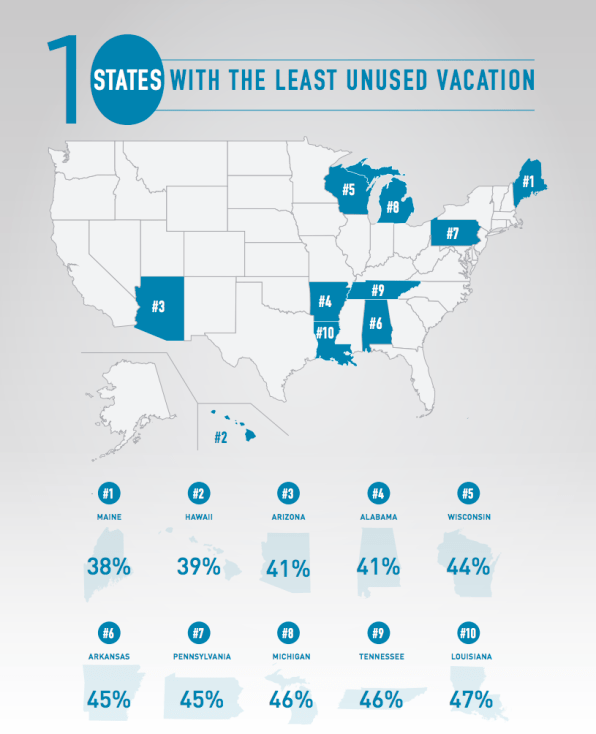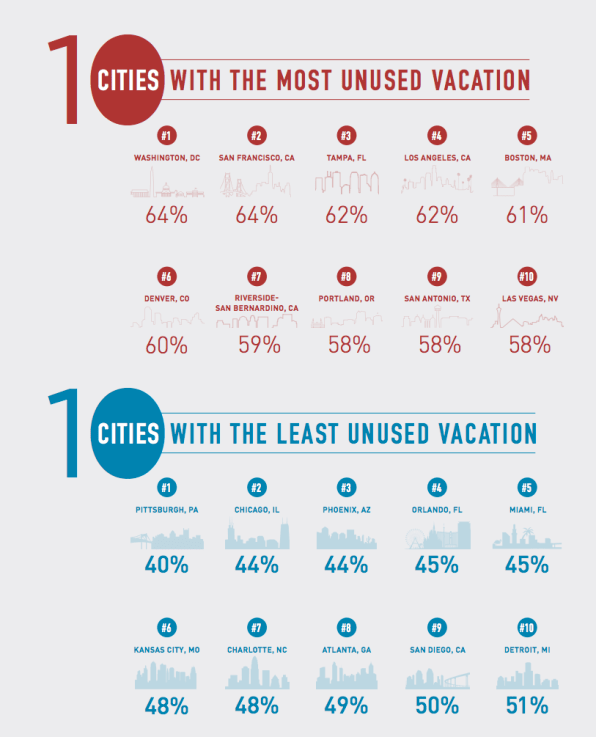This Is Who Takes The Least Vacation In the U.S.
We know that Americans log longer hours at work than their counterparts in other countries, are chronically sleep deprived, and don’t take enough vacation.
According to the annual Project: Time Off report, things may be getting a bit better. The analysts discovered that the 7,331 Americans surveyed (who work full time and therefore get paid time off from their employer) took an average of 16.8 days off in 2016, marking the second year in a row of taking slightly more vacation days.
That still means that more than half (54%) of U.S. workers are leaving paid time off on the table. As Project Time Off points out, not only does this hurt productivity overall, as breaks from work are necessary, it dings the economy. “If Americans were to use that vacation time, it would generate $128 billion in direct spending, and an overall economic impact of $236 billion for the U.S. economy,” the report’s authors write.
Drilling down reveals there are marked differences between who feels comfortable taking vacation and who doesn’t.

Some States and Cities Are Worse For Vacation
Part of it may be due to where you live. The report reveals that workers in Idaho (78% unused), New Hampshire (77% unused), and Alaska (73% unused) take the least amount of vacation time. At the city level employees in Washington, D.C., San Francisco, CA, and Tampa, FL, are most likely to leave vacation time unspent.
The Gender And Generation Factors
Gender and job title also play a role in whether or not workers take vacation. The gender divide is pretty pronounced. Nearly half (48%) of men reported using all their vacation time in 2016, But the study’s authors note, “While women say that vacation is ‘extremely’ important to them, more so than men (58% to 49%), only 44% of women use all their time off.” Millennial women reported cherishing their vacation benefits, yet were loath to use them. Forty-four percent of those women under 35 reported taking less time off than 51% of millennial men.
Given their age and likely job title, this runs somewhat counter to the finding that senior leaders are less likely to use their days than non-managers (61% to 52%).
What gives?

The Fear Factor
Overall, the report’s authors write, “Fear of returning to a mountain of work remains the top challenge to taking time off (43%), followed by the feeling that no one else can do the work (34%).”
States’ Cultural Differences
At the state level, the survey found that Idahoans’ chief concern was making sure they showed complete dedication to their job and that they worried taking time off would make them appear replaceable. Nearly a third felt their company culture didn’t promote time off.
Workers in New Hampshire had similar fears, but were most concerned about how taking vacation would look to their bosses. A full 38% worried about this vs. 18% of all workers across the country. Alaskans cited the cost of taking vacation as a barrier.
On the opposing side, the states where the workers take the most advantage of their time off are Maine, Hawaii, and Arizona. The license plates of Maine proudly declare the state “Vacationland” and the Aloha state is a destination for travelers as well. Both states’ workers reported having good vacation cultures at their companies, while Arizona’s workers report less on-the-job stress than workers overall (61% to 70%).

Younger Workers Worry More
As for the gender and generational divide, the survey revealed that women worry more than men that taking a vacation will making them appear less committed to their job. The starker dividing line is among millennial workers.
Millennial women are quicker than their male counterparts to extol the benefits of taking time away from work. The women are more likely to say it helps prevent burnout (85% to 76%), boosts morale (84% to 76%), improves focus (82% to 72%), and renews job commitment (76% to 68%), the report found. But they’re also more likely (69%) to say that they either hear nothing, mixed, or negative messages about taking vacation than men.
Millennial men, on the other hand, were found to be better planners than their female counterparts. Fifty-seven percent say they set aside time to plan out their vacation for the year, compared to just 49% of millennial women.
Martyrdom Doesn’t = Advancement
These numbers indicate that millennial women want to be work martyrs. “Nearly half (46%) of millennial women say it is a good thing for their boss to see them as a work martyr, more than the 43% of millennial men and 38% of overall respondents who agree,” the report’s authors write. They also point out that forfeiting time for fear of appearing less dedicated doesn’t help anyone get ahead.
The workers surveyed who didn’t take vacation were not only more stressed on the job, but less likely to have received a promotion within the last year (23% to 27%) and to have received a raise or bonus in the last three years (78% to 84%). “This is on top of the $66.4 billion in benefits they lost by forfeiting time last year,” they note.
We are still not using all of our vacation time, and it’s costing the economy $ 236 billion a year.
We know that Americans log longer hours at work than their counterparts in other countries, are chronically sleep deprived, and don’t take enough vacation.
Fast Company , Read Full Story
(27)













